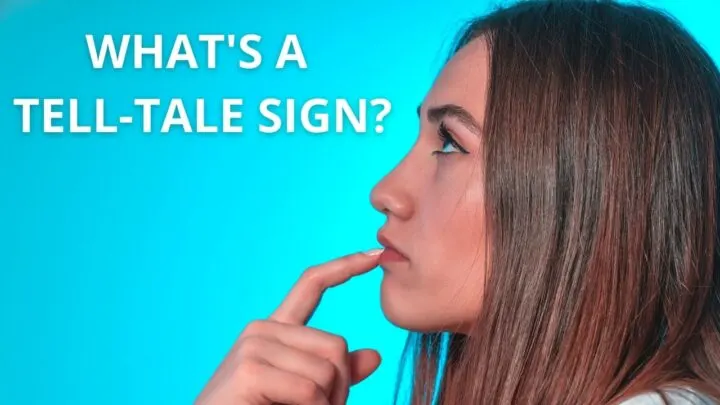There are a lot of expressions in English that mean something different from what they appear to mean. You wouldn’t be able to look at the words and identify the meaning.
Even in context, it can sometimes be difficult to figure out the exact meaning of many idioms.
The good news about “tell-tale sign” is that its meaning is actually right there in the words.
What does “tell-tale sign” mean?
A “tell-tale sign” is an indication that something exists or has happened. It is generally used to suggest that something that is secret or that at least is not obvious is being revealed. You can think of the phrase “tell-tale” as being a shortened form of “tell a tale.” “Sign” in this phrase does not literally mean the kind of sign that you hang up to inform people of things. In fact, if there were a literal sign, such as a stop sign, you would not refer to it as a “tell-tale sign.” Instead, “sign” in this phrase means an action, object, event or anything else that tells you that it is likely that something else exists or is happening.
How do you use the expression “tell-tale sign”?
You can use “tell-tale sign” anytime that you are talking about an indication of something that is revealed that would have been secret, hard to figure out or perhaps not immediately obvious.
Here’s one example:
In this sentence, it’s clear that Toby has eaten the jam even though he denies it because there are two tell-tale signs, the stickiness on his hands and the jam on his mouth.
A “tell-tale sign” is not always necessarily about something that is being deliberately hidden or that even involves a person.
Here’s another example:
Here’s yet another example:
Here are a few more examples to show you the many ways that you could use this phrase:
The implication here is that the story she is going to tell is one that makes her happy or is funny.
“The Tell-Tale Heart”
Probably the most famous use of the phrase “tell-tale” in the English language is in the story “The Tell-Tale Heart” by Edgar Allen Poe.
This story is widely anthologized in books used in schools and colleges in the United States, so even though it was written in the 19th century, many people are familiar with it.
In “The Tell-Tale Heart,” a murderer has buried his victim under the floor and is tormented by imagining he can hear his victim’s heart beating.
In the story, the beating of the heart is the “tell-tale sign” of both the murderer’s crime and his guilty conscience.

Hey fellow Linguaholics! It’s me, Marcel. I am the proud owner of linguaholic.com. Languages have always been my passion and I have studied Linguistics, Computational Linguistics and Sinology at the University of Zurich. It is my utmost pleasure to share with all of you guys what I know about languages and linguistics in general.

